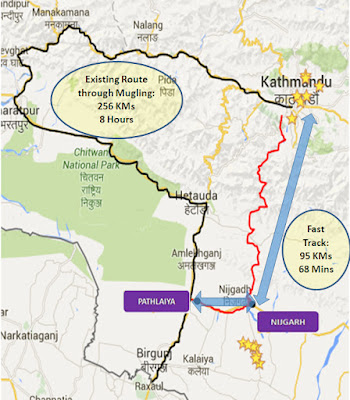Aim to create 400,000 employment
By
Modnath Dhakal/Yogesh Pokharel
Kathmandu, May 28: Finance Minister Bishnu Prasad
Poudel Saturday presented budget of Rs. 1.0485 trillion for coming Fiscal Year
2016/17 with special priority to post-quake reconstruction, infrastructure
development and constitution implementation.
FM Poudel has allocated Rs. 617.16 billon for
regular expenditure, Rs. 311.94 billion for development programmes and Rs.
119.81 billion for financial management.
Regular expenditure, development programmes and
financial management got 58.9, 29.7 and 11.4 per cent share of the total budget
respectively.
This budget is 20 per cent larger compared to the
budget of current FY 2015/16 while it is larger by 49.6 per cent than the
revised estimates of the budget of current fiscal.
This is the first budget unveiled following the
promulgation of the new constitution. It contains several popular programmes
that bring cheers to the people of various walks of life ranging from senior
citizens to civil servants to those living in the far-flung districts of
Karnali zone.
 |
| Finance Minister Bishnu Prasad Poudel |
FM Poudel plans to generate Rs. 565.89 billion from
revenue, Rs. 106.89 billion from foreign grant, Rs. 10 billion from principal
repayment, Rs. 111 billion from domestic borrowing and rest from foreign loan and other sources.
Major thrust of the budget include reconstruction of
quake damaged structure, hydro-electricity generation, transmission line
extension and distribution, infrastructure development like road, airport and
irrigation, employment generation and other pillars of economy like tourism and
manufacturing.
“I have also given priority to urban and local
infrastructure development, education, health and drinking water, social
security and good governance,” said the Finance Minister.
With the implementation of the budget, the
government aims at achieving the economic growth rate of 6.5 per cent and
containing inflation at 7.5 per cent.
In the current fiscal, the economy is estimated to
be up by 0.8 per cent and inflation to remain at 9.5 per cent.
Minister
Poudel raised the salary of government employee by 25 per cent, doubled the
social security allowances, and promised to generate 400,000 jobs within a
year.
Tax
ceiling raised
Income tax ceiling is raised to Rs. 350,000 for
single and Rs. 400,000 for married individual which was Rs. 250,000 for single
and 300,000 for married individual.
Customs and excise duty on alcohol, cigarette and
beer have been increased.
“I have expanded the tax-base. In order to give
relief to the small and medium tax-payers and bring them into the tax-net under
the voluntary declaration system, I have decreased income tax on business
transaction,” said Poudel.
Infrastructure
and agriculture
Through the budget, the government has promised to
link all villages with motorable road within two years, implement contributory
pension system and establish a separate monitoring mechanism for cooperative
sector.
The government plans to end load shedding within two
years and generate 10,000 megawatt of additional hydropower within next two
decades.
All structures related to education and health will
be reconstructed within three years and all quake damaged structures will be
reconstructed and rehabilitated in the next five years.
"Integrated development will be promoted in the
quake damaged settlement. Likewise, special programmes will be implemented for
the rehabilitation of flood and landslide victims in Dang, Banke, Bardiya,
Surkhet, Dailekh, Doti, Darchula, Sindhupalchowk and Taplejung districts,” read
the budget speech.
The budget has given special attention to the two
regional airports in Pokhara and Lumbini, second international airport in
Nijgadh, Postal Highway, North-South link roads, reservoir based
hydroelectricity projects, Kathmandu-Terai Fast Track road, irrigation,
Mid-Hill Highway, East-West Highway and other urban infrastructure.
New programmes like Prime Minister Agriculture
Modernization Project, development of zones and super zones, and self-reliant
programmes for meat, milk, egg and other agro-products are announced in the
budget.
Finance Minister Poudel has allocated budget for two
satellite cities in the Kathmandu Valley, 10 model cities along the Mid-Hill
Highway and rural infrastructure development.
“I have allocated Rs. 500 million each to 18
municipalities in the Terai region for infrastructure and social development as
per the Intensive Urban Development Programmes,” said Poudel.
Likewise, reconstruction of quake-damaged President
and Vice-President’s office, Singha Durbar, Supreme Court,
Legislature-Parliament, Lawmaker’s residence, Ministers’ quarters and General
Headquarters of Nepalese Army will be initiated in the coming fiscal year.
Railways
and Shipping
The government has allocated budget for the detailed
project report of East-West Electric railway,
Rashuwagadhi-Kathmandu-Pokhara-Lumbini railway and Metro railway in the
Kathmandu Valley.
“Construction of the track bed of Bardibas-Simara
railway will be completed in the next fiscal and spreading of tracks will
begin,” informed Minister Poudel.
Similarly, he promised to expedite preparations for
policy making required to operate Nepal’s own ship as per the country’s past
experiences and landlocked country’s right to use the sea route.







